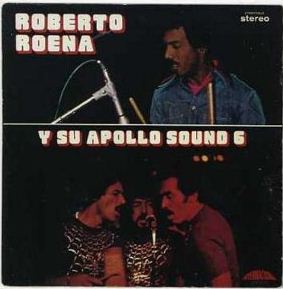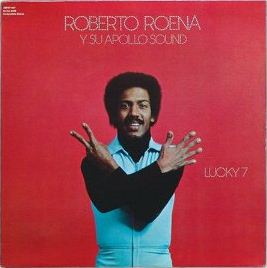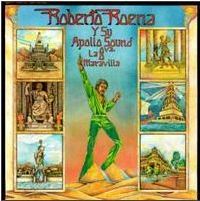Roberto Roena has enjoyed a long and successful career. At the pinnacle are 3 classic albums with his Apollo Sound that cemented his legacy in Salsa and Latin music.
The Apollo Sound albums #6, #7, and #8 cemented Roena’s legacy among Salsa music’s great.
Apollo Sound 6
Let me state the obvious. Roberto Roena was a very popular Salsa musician by the time he released Apollo Sound #6. By that time he had already enjoyed a Salsa music career most musicians would envy. He belonged to Cortijo y su Combo, which was one of the most popular bands in Latin music. He then joined Rafael Ithier when he left Cortijo to form El Gran Combo.
Note: you can read more details on the history of Roberto Roena in my 2-part series “The Legend of Roberto Roena” HERE. You can also read more about him in my series on the history of El Gran Combo – Part 1, HERE.
With El Gran Combo he established some of the front-men dance routines that is almost a standard in Salsa music bands today. He then formed his Apollo Sound and immediately started making Salsa hits. Before Apollo Sound #6, he participated in Fania All Stars Live at the Cheetah classic Salsa album. That album featured a song that highlighted him, “Ponte Duro”. He included this song in the Apollo Sound #5 album, which had been another successful Salsa album.

Apollo Sound #6 took Roberto Roena’s success to another level. The Apollo Sound was at its best. The album featured a selection of songs that made it a must have for Salsa fans. Tito Rodriguez’s remake of “El Que Se Fue” led the way in songs that became mega-hits in radio stations in Puerto Rico, New York, and other Latin American countries.
“Traicion” and “Parece Mentira” soon followed the same path. And “Herencia Rumbera” highlighted the Apollo Sound’s new “timbalero”, the young and speedy Endel Dueño. Other good songs help round off a very complete album. These include “Cucarachita Cucarachon”, and “Que Se Sepa” (same name, but a different song than the one he recorded in the previous album).
Apollo Sound #6 was my 2nd Roberto Roena Salsa album, as #5 with the catchy “Cui-Cui” was the 1st Apollo Sound album I purchased. But with Apollo Sound #6 I became a true admirer of the band and started my journey back to collect the previous Apollo Sound Salsa albums.
Apollo Sound 7, Lucky 7
Apollo Sound #6 was still hot in the radio when Lucky 7 came out. The single “Mi Desengaño” became a Salsa music mega-hit. As I have written in other blogs, this song took Salsa music mainstream. The poetic lyrics, the smooth and slow “son”, mixed with a bossa nova based mambo made this an easy song to listen for those that didn’t listen to Salsa music before.
I had friends that were “rockeros” (rock fans) who didn’t listen to Salsa music. They began listening to Salsa music because of this song. When La Sonora Ponceña released about the same time the album “Musical Conquest” with mainstream-type Salsa songs like “Bombacara Bomba” ,and “La Clave”, these rockeros became Salsa fans. But back to Lucky 7.

“Mi Desengaño” marked the debut of new singer Papo Sanchez to the band. His welcome was fantastic with “Mi Desengaño”, and he went on to become with Sammy Gonzalez a respectable duo of singers among Salsa music bands in Puerto Rico.
It also had the huge Salsa music hit “La Hija de la Vecina”. Lucky 7 also had several other good, although not spectacular songs. These include Ruben Blades’ “Que Me Castigue Dios”, “Fea”, and the catchy merengue “La Mala Maña”. Overall, #6 was a better Salsa album than Lucky 7, but Lucky 7 had “Mi Desengaño”.
Apollo Sound 8, La Octava Maravilla

“La Octava Maravilla” followed, and to me, at first it seemed the weakest of the trilogy. But, on 2nd look, it was as good as the 2 previous ones. “Rico Guaguanco” was the best Salsa music hit of the album. The song featured both Papo Sanchez and Sammy Gonzalez sharing singing duties.
However, from what I remember, “No lo Corras” was the 1st single in the radio. When I heard this 1st single, my 1st impression was that “La Octava Maravilla” had nothing marvelous to it. “No lo Corras” is not a bad Salsa song, but its not very danceable and has moronic lyrics. Why make this the 1st single? Then “La Hora Zero” began playing in the radio. At that point I decided I was not buying this Salsa album. For me, the good streak of Roberto Roena albums had come to an end.
But when I heard the entire Salsa album from a friend of mine that had bought it, I realized this was a better Salsa album than those two singles showed. I immediately loved “Rico Guaguanco” which for me is still among Roena’s best 5 Salsa songs. Ruben Blades contributed 2 songs; “Amistad Barata” and “Para Ser Rumbero”, both pretty good songs. Along with “Mañana es Domingo” it gave the album good enough reason to buy it. The other hits eventually bubbled to the hit charts and the “La Octava Maravilla” lived up to its name.
Subsequent Apollo Sound Albums
Apollo Sound #9 had a couple of good hits. “Marejada Feliz” and “La Distancia”, both where good radio Salsa songs, but not good songs to dance. However, the album had not much else to offer. Even Ruben Blades’ contribution to the project with “Nadie Sabe” was a rare flop since nobody knew about it. In my opinion it wasn’t that good a song.
Roberto Roena went on to redeem himself with Salsa album #10 “El Progreso”. This album provided Roberto Roena and his Apollo Sound several other hits. However, his legacy was cemented by the Apollo Sound albums #6, #7, and #8.
These Salsa albums were for Roena, what the 1971 Major League Baseball World Series was for Roberto Clemente; a coronation of a career which before then, already had enough success to make any Hall of Fame. The Roberto Roena bust in the “Placita de los Salseros” is the cherry in the top of an amazing Salsa music career.


[…] 9. Hector “Tempo” Alomar – a great Puerto Rican street “sonero” and percussionist, Tempo sang with many orchestras, including the Conjunto Libre and Roberto Roena’s Apollo Sound. […]